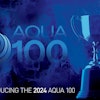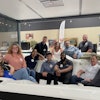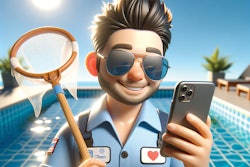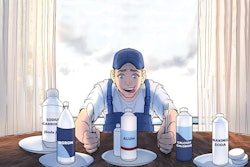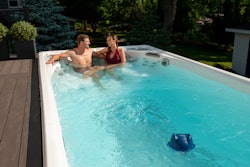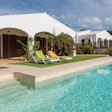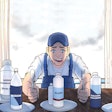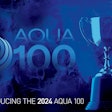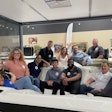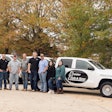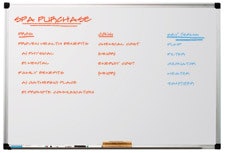
People would just stop in and buy.
Those days are gone, and unlikely to return anytime soon. Today's customers are not impulse buyers; they're much more careful about spa purchases. They take their time. They don't trust anybody but themselves to understand all the parameters and make the right choice. So where does the retailer fit in?
The same place a teacher fits into modern education, as a guide to the learning process - an assistant in the student's own search for knowledge. Only in this case, the student wants to learn about spas.
Spurred by the rise of the Internet, the age of the educated consumer started well before the recession, says Tim Martin, business development director, PDC Spas, Williamsport, Pa. And it's a much more careful and deliberate spa buyer that approaches a retailer today.
"They're much better informed, and by and large they're not making impulse spa decisions like they used to," he says. "And as the industry begins to move out of the economic doldrums, retailers must fully embrace their role as consultants to a decision maker."
Guided Learning
Nowadays, the first stop for any decision maker in spa acquisition mode is the keyboard, screen and URL. The reason is simple - and crucial for a salesperson to understand - there's a lot of information there, and in the words of Steve Hammock, president, Hot Spring Spas/Watkins Mfg., Vista, Calif., "[customers] think it's more impartial and it lets them make up their own mind.
"They are looking at blogs and want to see some reviews," he adds. "They want information from people who are not in the industry, and they seem to attach more credibility to what these complete strangers are saying than what might be on a company Web site."
In short, customers, while hungry for information, are often suspicious of the motives of a salesperson, and they don't want to be pushed.
These clear imperatives must be understood and addressed by the salesperson, who must therefore be a fountain of knowledge, at least appear to be objective, and refrain from twisting any arms.
Because the customer is making the rounds of multiple dealerships, and that first impression will decide who gets a second look. What this customer is really looking for in this initial visit, Martin says, "is the person who can help them understand all that information, and say to them, 'Here's what you really need to focus on as you decide.' They're looking for someone who can tailor their sales presentation so that it answers their questions."
The sale is very unlikely to be made at that point, Martin adds, but the salesperson and the product are already well positioned.
"Customers leave with many questions answered but they are still headed to your competitors. Your goal after that first visit is to understand who they are, what they're buying a spa for and what models they're interested in, what their time frame is, and of course, you must have their contact information.
"Getting that information is critical," he adds, "because you must be relentless in helping that customer through the cycle. Not in hounding them, because that will turn them off, but in giving them what they need. If they're interested in energy consumption, make sure you're right there with reports and information."
Classroom Discipline
Hammock heartily agrees that customers are coming into the store with more information already in hand, but in the current economy, that education is often coupled with a strong belief that retailers are hurting, and the customer can take advantage of the situation.
"They expect a deal. They really think they can 'steal' one," he says. "They're thinking, 'Now is the best time to make a big purchase because retailers are going to give me what I want at the price I want to pay.'"
Probably the most commonplace tactic customers use in grinding down a retailer is to play one retailer off against another. It's as old as the souk in ancient Cairo: Walk away toward the next stall, listening for the price to drop.
It's always been that way in the spa business, Hammock says, but while customers may appear to be indifferent to everything but price, in fact, they're not.
"The customer ultimately gets the spa he wants. And what he is trying to do is get the best deal on the spa he prefers. So he'll try to play the competitor off against you, but ultimately he can't get what you're offering at the other place. And so my advice to retailers would be to have confidence in what you carry and your prices, and know exactly why customers should buy from you at your price."
"Going through the storm, as dealers have," adds Mike Dunn, vice president of sales and marketing at Hot Spring Spas, "it's easy to feel beaten down. And if that customer comes through that door and smells blood, they think they can take advantage of the situation.
"So it's important to maintain a positive attitude, be upbeat, and let consumers know that we are doing just fine. We've got a great product here. We've been in business a while and we've weathered the storm. We're taking care of customers and providing great experiences."
Listening Beats Talking
Dunn points out a third critical aspect of the customer-retailer relationship, and that is a clear understanding of how the customer defines value. We all know what the word means within our own minds, but it's the customer standing in the showroom that counts.
For a customer that's prepared to spend $8,000 for a spa, it may mean getting a host of cool features that used to demand $10,000. For another customer, value may mean being able to slip into a well-constructed tub that will last for 10 years for under $5,500.
"Remember, it's not the lowest price that wins," Martin says, "it's what the customer perceives as the best value. For that reason, we train our retailers to figure out which spa the customer really wants, and then always have an event on the horizon so they can say, 'I know you're interested in the Aruba model, and we've got a sale coming up in two weeks (or whatever it is). I'll have a couple of Arubas in from the factory, and I'll make sure there's a really good deal on them.'
"That's what the consumer wants to hear."
Listening to the customer is even more important in the current economic climate, Dunn adds, where there's a tendency to make assumptions about our customers' circumstances.
"I think it's important for the retailer right now to qualify customers," he says. "In this environment in which we're reading about new thought processes of consumers, and how they're redefining value, it's easy sometimes to simply sell them a less expensive spa. And I think it's important to recognize that there are still customers out there that want what they want. There certainly are high-end spas being sold."
In fact, some economic data point to pent-up spa demand - and some pent-up cash as well - that could fuel a healthy resurgence of spa sales, notes Casey Loyd, president of Cal Spas, Pomona, Calif.
He says that according to recent economic surveys, the personal savings rate has increased from a paltry 0.5 percent before the recession to 8 percent, leaving customers with more money to spend.
At the same time, he says, "I think the demand for our type of product has built up. The recession doesn't change that - recession or no, we still want things. But we pull back because we're not sure of the economy.
"After two or three years of this, that clientele has built a little bit of a reserve. Consumer confidence is starting to loosen up - slowly. Nothing goes up as fast as it came down, but people that have been hanging onto their money are starting to look again."
As they do - if they do - retailers should be ready to start the patient process of student-driven spa education.
Comments or thoughts on this article? Please e-mail [email protected].
Stop Runnin' People Down - It Makes Everybody Look Bad
One of the great curses of the spa industry has been the tendency of sellers to go negative against the competition. The problem is not exclusive to the hot tub business, of course, but many believe it's more trenchant in spa retailing and has diminished the reputation of the industry as whole in the eyes of customers.
Steve Hammock, president, Hot Spring Spas/Watkins Mfg., Vista, Calif., an industry veteran with decades of experience in the hot water business, believes this defect has gotten worse in the recession. He had this to say on the matter:
"I've been in this industry a long time, and while this idea isn't new it becomes heightened in a tough economy, where there are fewer sales opportunities.
Every time we've done consumer research, we've heard the same thing. And that is that the nature of how we sell can really turn off a consumer when we approach it from a negative perspective.
That is, when we don't sell our products on their own merits, and instead we go after the other guy.
That's a real turnoff for the customer. And when there are few sales opportunities out there, people are more desperate, and they're trying to make a sale, sometimes they can slip into a negative selling mode.
My question for the retailer, and even the industry at large is: Can we stop doing that?
The feedback that we get from consumers, and I'm speaking of current information, is that negative selling continues, and consumers are saying, 'I don't like it. And I don't want to go into a place where salespeople are doing it.'
"There is a pervasive consumer perception that we do just that, and when we do, we're really hurting ourselves as an industry. We have to have the discipline to resist the urge to go negative, despite the climate."
-S.W.




















